To be yourself in a world that is constantly trying to make you something else is the greatest accomplishment.

The multi-billion dollar industry built around teaching people how to present themselves isn't just wrong - it's actively dangerous to society's future
The young executive stands before the mirror, rehearsing her "elevator pitch" for the fifteenth time. A college student memorizes his "personal brand statement" before a networking event. A sales representative practices her "power pose" before meeting a client. They're all participating in what future historians will likely regard as one of the great mass delusions of the early 21st century: the belief that authentic human connection can be reduced to a set of performative techniques.
This isn't just wrong. It's catastrophically wrong. And its implications extend far beyond wasted time and ineffective networking.
The $11.3 billion self-improvement industry has constructed an elaborate mythology around the art of self-introduction, built upon a foundation of pop psychology and oversimplified neuroscience. But what they're actually creating is a generation of professional frauds – individuals so trained in performance that they've lost the ability to engage in genuine human interaction. We're witnessing the corporate equivalent of social media filters: a world where everyone has learned to present a perfect, artificial facade while the capacity for authentic connection withers.
The consequences are already emerging, and they're far more severe than merely awkward networking events.
The Death of Authentic Leadership
Consider the implications for corporate leadership. The current paradigm of self-presentation creates what I call "performative leaders" – executives who are excellent at presenting themselves but increasingly disconnected from genuine human interaction. These leaders, selected and promoted based on their ability to perform prescribed behaviors, often lack the authentic connection skills necessary for effective leadership.
This explains a puzzling phenomenon: why do we simultaneously have more leadership training than ever before and a persistent crisis of leadership across industries? The answer is simple but disturbing: we're selecting and training for performance rather than substance. It's the corporate equivalent of teaching people to act confident rather than developing actual competence.
The Neuroscience of Artificiality
The problem goes deeper than mere inauthenticity. Recent neuroscience research suggests that chronic performance of prescribed social behaviors can actually reshape neural pathways, creating what I term "artificial social processing" (ASP). Individuals with high ASP scores show reduced activity in brain regions associated with genuine empathy and increased activity in regions associated with performance and social calculation.
In other words, we're literally rewiring human brains to prioritize performance over authentic connection. The implications for society are staggering.
The Cultural Catastrophe
This performance-based paradigm isn't just failing – it's actively harmful in at least five critical ways:
- The Competence Crisis: The emphasis on presentation skills over substantive capability creates what I call the "competence façade" – individuals who are excellent at presenting themselves as experts but lack genuine expertise. This isn't just imposter syndrome; it's actual imposture, institutionalized and celebrated.
- The Innovation Impediment: Genuine innovation requires authentic communication and the ability to engage with uncertainty. The performance paradigm creates what I term "innovation theater" – where people become more focused on presenting themselves as innovative than actually engaging in the messy, often awkward process of real innovation.
- The Diversity Delusion: Current self-presentation training, while claiming to promote diversity, actually enforces a narrow set of behavioral norms derived primarily from Western, upper-middle-class professional culture. This creates a form of cultural imperialism masquerading as professional development.
- The Trust Deficit: As more people become adept at performative behavior, the general level of social trust decreases. This creates a vicious cycle where genuine behavior becomes increasingly rare and therefore increasingly disadvantaged.
- The Authenticity Paradox: The more organizations emphasize "authentic leadership" and "being yourself," while simultaneously promoting standardized behavioral scripts, the more they create cognitive dissonance that leads to psychological stress and decreased performance.
The Top Articles of the Week
100% Humanly Curated Collection of Curious Content
The Social Media Parallel
This crisis parallels the well-documented effects of social media on personal identity and social interaction. Just as Instagram filters created a generation insecure about their unfiltered appearance, corporate presentation training is creating a workforce insecure about their unscripted professional selves.
The parallels are striking:
- Both emphasize performance over substance
- Both create artificial standards of "perfection"
- Both lead to decreased authentic interaction
- Both contribute to rising anxiety and impostor syndrome
- Both create a gap between presented self and actual self
The Generational Time Bomb
What's truly alarming is the generational impact. Young professionals entering the workforce today have often never experienced a professional environment that wasn't heavily performative. They've been trained since college (or earlier) to view every interaction as a performance to be optimized, every conversation as a networking opportunity to be maximized.
This creates what I call "professional performance disorder" (PPD) – a condition where individuals become so habituated to performance that they lose the ability to engage in genuine professional interactions. The symptoms include:
- Chronic inability to engage in unstructured professional conversations
- Excessive reliance on prescribed scripts and behaviors
- Anxiety when unable to prepare for social interactions
- Difficulty building genuine professional relationships
- Persistent feeling of fraudulence despite external success
The Hidden Economic Cost
The economic impact of this crisis is both substantial and largely invisible. Organizations are:
- Spending billions on training that actually reduces authentic leadership capability
- Making hiring decisions based on performance skills rather than actual competence
- Losing productivity to the cognitive load of constant performance
- Failing to build genuine team cohesion due to performative interactions
- Missing opportunities for innovation due to scripted thinking
The Counter-Argument: The Necessity of Social Scripts
It's important to acknowledge that not everyone views the emphasis on self-presentation as inherently negative. Proponents argue that social scripts and presentation skills serve several valuable functions:
- Leveling the Playing Field: Standardized presentation techniques can help level the playing field for individuals who may not have naturally strong social skills or come from backgrounds where professional norms weren't explicitly taught.
- Reducing Cognitive Load: Having a set of established behaviors and scripts can reduce the cognitive load in professional situations, allowing individuals to focus on substance rather than worrying about how to act.
- Cultural Translation: In an increasingly global business environment, these techniques can serve as a common language, helping to bridge cultural differences in professional settings.
- Anxiety Reduction: For many, having a clear set of expectations and behaviors can significantly reduce anxiety in professional situations.
While these arguments have merit, they ultimately fail to address the core issue: the difference between tools that supplement authentic interaction and a system that replaces authenticity with performance.
The Deeper Psychological Impact
The psychological toll of constant performance goes beyond simple stress or inauthenticity. It creates what psychologists call a "divided self" – a state where individuals maintain a sharp distinction between their "true" self and their "professional" self. This division can lead to:
- Moral Disengagement: When individuals view their professional persona as separate from their authentic self, it becomes easier to engage in unethical behavior while maintaining a positive self-image.
- Burnout: The constant effort required to maintain a performative professional self is emotionally exhausting, contributing to high rates of burnout across industries.
- Imposter Syndrome: The gap between the performed self and the authentic self fuels feelings of fraudulence, even among highly competent individuals.
- Decreased Creativity: Authentic creativity often requires vulnerability and the willingness to appear foolish or uncertain – qualities that are antithetical to the polished performance paradigm.
The Societal Ripple Effects
The implications of this crisis extend far beyond the corporate world. As performative professional behavior becomes normalized, we see its influence spreading into other areas of society:
- Politics: The emphasis on performance over substance in business bleeds into politics, contributing to a political culture that prioritizes soundbites and image over genuine policy discussion.
- Education: Schools, under pressure to prepare students for the professional world, increasingly emphasize performance skills over critical thinking and authentic expression.
- Personal Relationships: As people become habituated to performative behavior in professional settings, this mindset can seep into personal relationships, creating a culture of inauthenticity that extends beyond the workplace.
- Mental Health: The constant pressure to perform, coupled with feelings of inauthenticity, contributes to rising rates of anxiety and depression in society at large.
The Technology Accelerant
While technology isn't the root cause of this crisis, it serves as a powerful accelerant. The rise of personal branding on social media platforms like LinkedIn has created a 24/7 performance culture where individuals feel constant pressure to curate their professional image.
Moreover, the increasing use of AI in hiring and performance evaluation creates a feedback loop that reinforces performative behavior. When algorithms are trained on data sets that prioritize certain presentation styles, it creates a self-reinforcing cycle that further entrenches the performance paradigm.
The Neurodiversity Challenge
The current emphasis on standardized presentation skills poses a particular challenge for neurodivergent individuals. Many neurodivergent people, including those with autism spectrum disorders, ADHD, or social anxiety, may struggle with the unwritten rules of professional performance.
This creates a lose-lose situation: neurodivergent individuals are often disadvantaged in professional settings, while organizations miss out on the unique perspectives and skills these individuals can offer. A more authentic approach to professional interaction would not only be more inclusive but could also drive innovation by incorporating diverse cognitive styles.
The Way Forward: Radical Authenticity
The solution isn't gentle reform – it's radical reimagining of how we approach professional interaction. This requires:
- Abandoning the Performance Paradigm: We must explicitly reject the notion that professional success requires performative behavior. This means dismantling much of the current professional development industry.
- Developing New Metrics: Instead of measuring presentation skills, we need metrics for authentic engagement, genuine leadership capability, and actual competence.
- Rewiring Educational Systems: Professional education must shift from teaching performance to developing genuine interaction capabilities. This means fundamentally redesigning everything from MBA programs to corporate training.
- Creating Safe Spaces for Authenticity: Organizations need to actively create environments where authentic behavior is not just permitted but required. This means eliminating many current "professional development" practices.
- Addressing the Generational Gap: We need specific interventions for younger professionals who have been trained in performance-based interaction, helping them develop genuine connection capabilities.
The Authenticity Revolution: Beyond Individual Change
While individual efforts to embrace authenticity are valuable, truly addressing this crisis requires systemic change. This could include:
- Regulatory Approaches: Just as there are truth-in-advertising laws, we might need "truth-in-networking" regulations that discourage overtly performative behavior in professional settings.
- Educational Reform: Business schools and professional training programs need to fundamentally rethink their approach, emphasizing genuine leadership skills over presentation techniques.
- Corporate Culture Overhaul: Organizations need to actively create cultures that not only permit but celebrate authentic behavior, even when it doesn't conform to traditional professional norms.
- Technology Solutions: We need to develop technologies that encourage authentic interaction rather than performance. This could include AI systems designed to evaluate genuine competence rather than presentation skills.
- Media Literacy: Just as we teach media literacy to help people navigate the world of advertising and propaganda, we need to teach "performance literacy" to help individuals recognize and resist the pressure to constantly perform.
A Wise Investment of Your Time
List of YouTube videos that captured my undivided attention.
The Ethical Imperative
Ultimately, the performance paradigm isn't just ineffective – it's unethical. It asks individuals to constantly engage in a form of deception, presenting a curated version of themselves rather than engaging authentically. This normalizes dishonesty and erodes the trust that's essential for a functioning society.
Moreover, it's a form of emotional labor that's rarely acknowledged or compensated. The constant effort required to maintain a performative professional self is a hidden tax on workers, one that disproportionately affects those who don't naturally fit into the narrow mold of "professional" behavior.
The Urgency of Now
This isn't a problem we can afford to address gradually. Every year, more young professionals enter the workforce trained in performance rather than genuine interaction. Every year, more organizations embed these destructive practices deeper into their culture. Every year, the capacity for authentic professional interaction deteriorates further.
The young executive staring in the mirror isn't just wasting her time – she's participating in a system that's actively damaging her ability to connect authentically with others. The college student memorizing his personal brand statement isn't just engaged in a pointless exercise – he's being conditioned to prioritize performance over substance. The sales representative practicing power poses isn't just following dubious science – she's participating in a culture that's eroding genuine human connection.
The Path Forward: Embracing Radical Authenticity
The solution to this crisis isn't to simply tell people to "be themselves." In a world that has so deeply internalized the performance paradigm, authentic behavior can feel profoundly uncomfortable or even dangerous.
Instead, we need a movement of radical authenticity – a concerted effort to create spaces where people can engage genuinely, even if that means moments of awkwardness or uncertainty. This requires courage from leaders willing to model authentic behavior, even when it doesn't conform to polished professional norms.
It also requires a fundamental rethinking of what we value in professional settings. Instead of prioritizing smooth presentations and perfectly crafted elevator pitches, we need to learn to value genuine enthusiasm, honest uncertainty, and the willingness to engage in real, unscripted human interaction.
The stakes couldn't be higher. If we don't address this crisis, we risk creating a professional world that's a hall of mirrors – all reflection and no substance. But if we can summon the courage to shatter those mirrors and embrace radical authenticity, we have the opportunity to create a working world that's not just more effective, but more human.
The wolf isn't coming. It's already here, dressed in perfectly practiced professional behavior, spouting perfectly crafted personal brand statements, and destroying our capacity for genuine human connection one elevator pitch at a time.
The choice is ours. Will we continue down the path of performance, or will we have the courage to embrace authentic human connection? The future of our professional lives – and perhaps of society itself – hangs in the balance. The clock is ticking, and the time for radical authenticity is now.

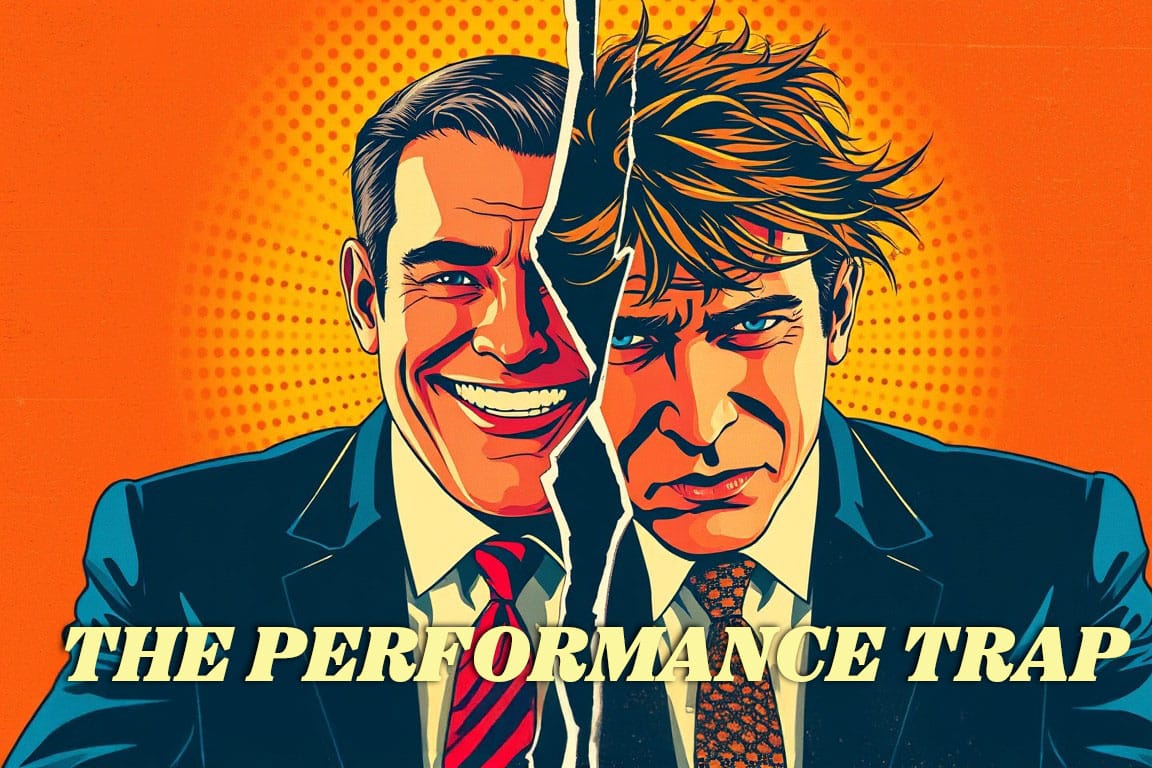

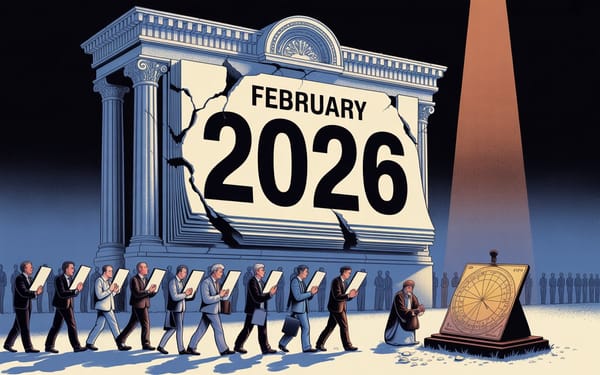
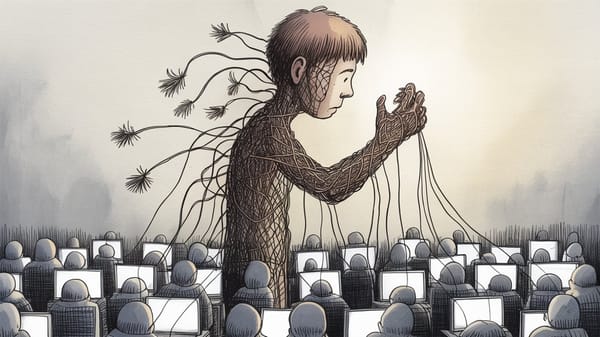

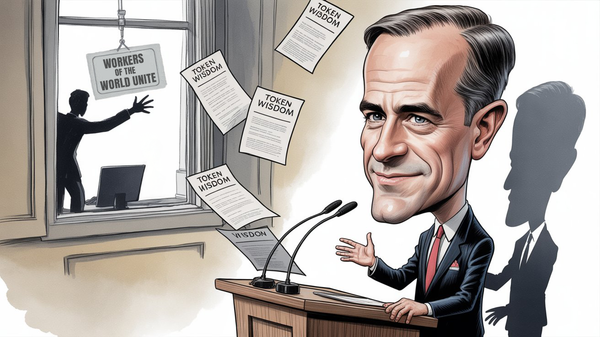
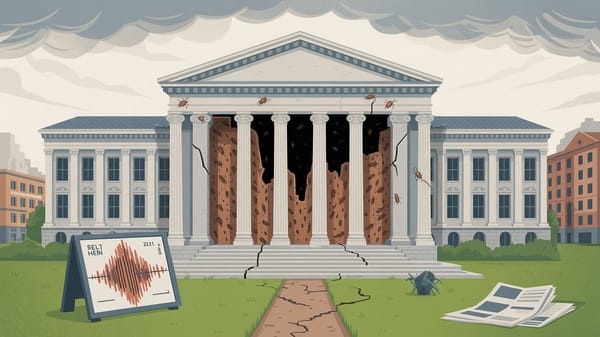
Member discussion